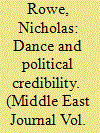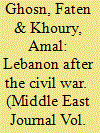|
|
|
Sort Order |
|
|
|
Items / Page
|
|
|
|
|
|
|
| Srl | Item |
| 1 |
ID:
110335


|
|
|
|
|
| Publication |
2011.
|
| Summary/Abstract |
This article examines how the rural folkdance dabkeh has, in the last century, been appropriated and reinvented as a tradition in order to construct the imagined communities of Zionism, pan-Arabism, and Palestinian Nationalism within Palestine/Israel. This appropriation has led to extensive debates and suppositions on the source, meanings, and cultural ownership of dabkeh. The following historical narratives, emerging from interviews with dance practitioners and dance advocates in the West Bank, Israel, and Lebanon, and from literature in libraries and archives in the West Bank, Israel, and Great Britain, draw attention to the salient links between dance and politics and the multiple ways in which collective identities can be constructed and deconstructed. These histories further raise questions about how local cultural autonomy and sustainability within the Occupied Palestinian Territories have been affected by the process of political appropriation.
|
|
|
|
|
|
|
|
|
|
|
|
|
|
|
|
| 2 |
ID:
110340


|
|
|
|
|
| Publication |
2011.
|
| Summary/Abstract |
This article traces the development and evolution of the Turkish heroin trade against the backdrop of the Republic of Turkey's long transition from imperial core to nation-state. In taking up heroin's relationship to modern Turkey, I would like to specifically explore the meaning and manifestations of what many inside and outside of academia have called the "deep state." Heroin, I argue, was and is one of the most vital enablers of the factional "deep state" rivalries that compete for power in Ankara, adding a steady violent dimension to local and national politics.
|
|
|
|
|
|
|
|
|
|
|
|
|
|
|
|
| 3 |
ID:
110341


|
|
|
|
|
| Publication |
2011.
|
| Summary/Abstract |
The first encounter between the World Bank and Iran over Iran's oil dispute with Great Britain took place in Washington, DC. The World Bank's Vice President, Robert Garner, met with Iranian Prime Minister Dr. Mohammad Mossadegh, who was in the United States to address a British resolution pending before the United Nations Security Council. In three Bank missions to Iran between January and March 1952, several features of the Bank's proposed temporary management of the recently nationalized Iranian oil company were discussed. The Iranian government refused to approve the employment of British nationals under the Bank's operation of the nationalized oil company. The Bank, meanwhile, prevented by its Articles of Agreement from excluding employment of personnel from one of its members, could not agree to undertake the temporary operation of Iran's nationalized oil company. After a few months' break in contact between Iran and the Bank, the Iranian government sent a representative to the Bank to reopen the discussions - but unaccompanied by a controversial international adviser Mossadegh had requested. Consequently, when the oil talks reopened, the Iranian representative was unprepared to fully articulate a new Iranian proposal that would allow the reengagement of British personnel. Unfortunately, the Bank team did not follow up on this meeting and did not support the Iranian representative in refining the new proposal. Less than a year later, Mossadegh was deposed, and an international consortium took over operation of the Iranian oil company. The fall of Mossadegh demolished the hope for national sovereignty and full democracy in Iran - with far-reaching consequences for the Iranian people and the international community.
|
|
|
|
|
|
|
|
|
|
|
|
|
|
|
|
| 4 |
ID:
110337


|
|
|
|
|
| Publication |
2011.
|
| Summary/Abstract |
This article investigates the effectiveness of Lebanon's post-conflict strategies by exploring the "reconciliation" efforts that were undertaken after the war, and highlights the obstacles to such efforts. While Lebanon signed a peace agreement in October 1989 to officially end a 15-year civil war, today it is still a troubled country. Many have attributed Lebanon's inability to shed its conflict-prone past to its sectarian system; however, this article traces the ongoing instability, in part, to the failure of the government to deal effectively with the abuses of the civil war.
|
|
|
|
|
|
|
|
|
|
|
|
|
|
|
|
| 5 |
ID:
110339


|
|
|
|
|
| Publication |
2011.
|
| Summary/Abstract |
This article considers US-French collaboration on Lebanon, especially between 2004 and 2008. It examines the political background to such collaboration and its manifestations at the United Nations Security Council and in the two powers' relations with Lebanon, Syria, and other regional players. We argue that the changed political landscape in the Middle East following the 2003 US invasion of Iraq (particularly Syrian policy in Lebanon and towards Iraq) as well as developments in the Lebanese theater since the turn of the 21st century prompted such collaboration. After briefly discussing the insights of Realist and Liberal Internationalist theories of international relations, the article concludes that Daniel Deudney's Republican Security Theory offers the most plausible explanation for US-French collaboration on Lebanon.
|
|
|
|
|
|
|
|
|
|
|
|
|
|
|
|
|
|
|
|
|